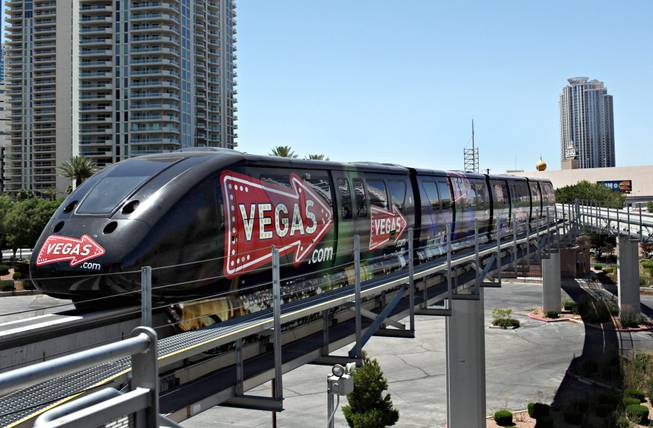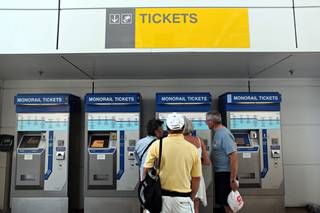
The Las Vegas Monorail is shown Monday, June 22, 2009. The Las Vegas Monorail Company filed for Chapter 11 bankruptcy protection Wednesday, Jan. 13, 2010 but will continue to operate, company officials said.
Published Wednesday, Feb. 3, 2010 | 7:13 p.m.
Updated Thursday, Feb. 4, 2010 | 9:35 a.m.
Sun Archives
Related Document
Beyond the Sun
In documents filed with U.S. Bankruptcy Court today, the Las Vegas Monorail rejected the suggestion that it should have pursued reorganization of its massive debts as a “municipality” under Chapter 9 rather than the decision it made to seek Chapter 11 protection as a nonprofit corporation.
The monorail, which filed its Chapter 11 bankruptcy case last month, submitted the motion in advance of a Feb. 17 hearing before U.S. Bankruptcy Judge Bruce Markell. He will determine whether the bankruptcy case will proceed.
Ambac Assurance Corp. of Wisconsin, which insured the bulk of tax-exempt bonds issued by the state to construct the monorail, and Wells Fargo Bank, which has also done business with the transit company, have argued that the monorail should have filed under Chapter 9.
They have argued that the monorail acts like a municipality under bankruptcy law because its board members are appointed by the governor, complies with open meeting laws, serves a public benefit and enjoys tax-exempt status.
But monorail attorneys argued in their motion that the transit operator was “formed, operated and managed as a nonprofit corporation, and thus is a ‘corporation’ that may be a debtor under Chapter 11.”
The attorneys, from the Las Vegas law firm Gordon Silver, also argued that “the definition of ‘municipality’ should not be construed so as to include quasi-public or nonprofit corporations like the debtor...”
They stated that no government agency or representative participates in any aspect of the monorail’s operations or management beyond the governor’s limited authority. No government money is commingled with monorail funds, the attorneys said.
Nevada law, they said, “authorizes the creation and operation of the monorail, but does not require that the person owning and operating the monorail be any type of public or municipal entity.”
The fact that the monorail had to obtain a franchise agreement and business license from Clark County “similar to other private businesses, is further indicative that the debtor is not part of or an instrumentality of the state,” the attorneys argued.
They concluded that the monorail, which estimates its debts to be between $500 million and $1 billion, doesn’t even have authority to file for Chapter 9 in Nevada if it cannot pursue Chapter 11.
That is based on the argument that the monorail is not a local government and therefore “cannot take advantage of Nevada’s provisions for insolvent government institutions.”
Ambac attorney William Smith said, though, that the monorail "declared itself an instrumentality of the state in order to attract investors and obtain government-issued, tax-exempt bonds. It cannot now deny that fact in order to shirk its legal duties to its creditors."
Boyd Law School Professor Nancy Rapoport told the Las Vegas Sun last month that creditors such as Ambac might think they would have more say over any potential sale of monorail assets outside the conduct of ordinary business under Chapter 9 than under Chapter 11.


Join the Discussion:
Check this out for a full explanation of our conversion to the LiveFyre commenting system and instructions on how to sign up for an account.
Full comments policy